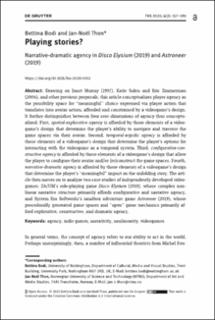| dc.contributor.author | Bodi, Bettina | |
| dc.contributor.author | Thon, Jan-Noël | |
| dc.date.accessioned | 2021-03-29T13:06:09Z | |
| dc.date.available | 2021-03-29T13:06:09Z | |
| dc.date.created | 2021-01-12T18:15:24Z | |
| dc.date.issued | 2020 | |
| dc.identifier.citation | Frontiers of Narrative Studies (FNS). 2020, 6 (2), 157-190. | en_US |
| dc.identifier.issn | 2509-4882 | |
| dc.identifier.uri | https://hdl.handle.net/11250/2736012 | |
| dc.description.abstract | Drawing on Janet Murray (1997), Katie Salen and Eric Zimmerman (2004), and other previous proposals, this article conceptualizes player agency as the possibility space for “meaningful” choice expressed via player action that translates into avatar action, afforded and constrained by a videogame’s design. It further distinguishes between four core dimensions of agency thus conceptualized: First, spatial-explorative agency is afforded by those elements of a videogame’s design that determine the player’s ability to navigate and traverse the game spaces via their avatar. Second, temporal-ergodic agency is afforded by those elements of a videogame’s design that determine the player’s options for interacting with the videogame as a temporal system. Third, configurative-constructive agency is afforded by those elements of a videogame’s design that allow the player to configure their avatar and/or (re)construct the game spaces. Fourth, narrative-dramatic agency is afforded by those elements of a videogame’s design that determine the player’s “meaningful” impact on the unfolding story. The article then moves on to analyze two case studies of independently developed videogames: ZA/UM’s role-playing game Disco Elysium (2019), whose complex nonlinear narrative structure primarily affords configurative and narrative agency, and System Era Softworks’s sandbox adventure game Astroneer (2019), whose procedurally generated game spaces and “open” game mechanics primarily afford explorative, constructive, and dramatic agency. | en_US |
| dc.language.iso | eng | en_US |
| dc.publisher | De Gruyter | en_US |
| dc.rights | Navngivelse 4.0 Internasjonal | * |
| dc.rights.uri | http://creativecommons.org/licenses/by/4.0/deed.no | * |
| dc.title | Playing stories? Narrative-dramatic agency in Disco Elysium (2019) and Astroneer (2019) | en_US |
| dc.type | Peer reviewed | en_US |
| dc.type | Journal article | en_US |
| dc.description.version | publishedVersion | en_US |
| dc.source.pagenumber | 157-190 | en_US |
| dc.source.volume | 6 | en_US |
| dc.source.journal | Frontiers of Narrative Studies (FNS) | en_US |
| dc.source.issue | 2 | en_US |
| dc.identifier.cristin | 1870143 | |
| dc.description.localcode | © 2021 Bettina Bodi and Jan-Noël Thon, published by Walter de Gruyter GmbH, Berlin/Boston. This work is licensed under the Creative Commons Attribution 4.0 International License. | en_US |
| cristin.ispublished | true | |
| cristin.fulltext | original | |
| cristin.qualitycode | 1 | |

